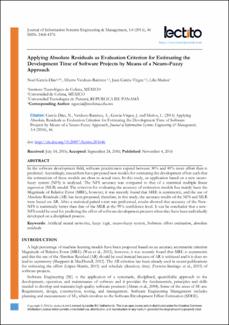El sistema se apagará debido a tareas habituales de mantenimiento. Por favor, guarde su trabajo y desconéctese.
Applying Absolute Residuals as Evaluation Criterion for Estimating the Development Time of Software Projects by Means of a Neuro-Fuzzy Approach
Date
11/04/201611/04/2016
Author
García-Díaz, Noel
Verduzo-Ramirez, Alberto
Garcia-Virgen, Juan
Muñoz, Lilia
Metadata
Show full item recordAbstract
In the software development field, software practitioners expend between 30% and 40% more effort than is predicted. Accordingly, researchers have proposed new models for estimating the development effort such that the estimations of these models are close to actual ones. In this study, an application based on a new neuro-fuzzy system (NFS) is analyzed. The NFS accuracy was compared to that of a statistical multiple linear regression (MLR) model. The criterion for evaluating the accuracy of estimation models has mainly been the Magnitude of Relative Error (MRE), however, it was recently found that MRE is asymmetric, and the use of Absolute Residuals (AR) has been proposed, therefore, in this study, the accuracy results of the NFS and MLR were based on AR. After a statistical paired t-test was performed, results showed that accuracy of the New-NFS is statistically better than that of the MLR at the 99% confidence level. It can be concluded that a new-NFS could be used for predicting the effort of software development projects when they have been individually developed on a disciplined process.
Collections
Related items
Showing items related by title, author, creator and subject.
-
Irrigation System Through Intelligent Agents Implemented With Arduino Technology
Salazar, Rodolfo; Rangel, José Carlos; Pinzón, Cristian; Rodríguez, Abel (11/01/2013)The water has become in recent years a valuable and increasingly scarce. Its proper use in agriculture has demanded incorporate new technologies, mainly in the area of ICT. In this paper we present a smart irrigation system ... -
Un Enfoque de Lógica Borrosa para el Modelado de los Flujos de Pasajeros y el Tiempo de Parada
Berbey Álvarez, Aranzazu; Caballero, Rony (2012-07-04)La estimación del flujo de pasajeros y el tiempo de parada en la estación constituyen importante tareas para la planificación de los sistemas de masivos de pasajeros. Sin embargo, los métodos clásicos son difíciles de ... -
A Fuzzy Logic Inference Approach for the Estimation of the Passengers Flow Demand
Berbey Álvarez, Aranzazu; Caballero, Rony; Sanz Bobi, Juan de Dios; Galán, Ramón (2016-07-02)This paper presents a new approach that designs the flow of passengers in mass transportation systems in presence of uncertainties. One of the techniques used for the prediction of passenger demand is the origin- destination ...
